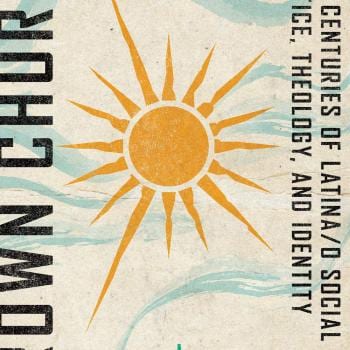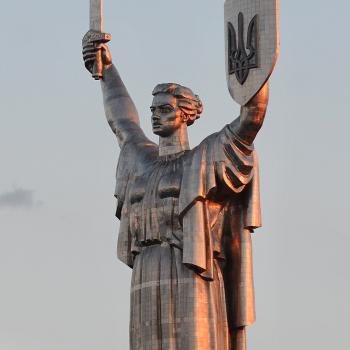This post on politician Rand Paul, the latest in a series that has included Pentecostals, holiness groups, and Charles Spurgeon, will probably perturb everyone. Conservatives will object because they won’t want to be linked to the “liberal” position of pacifism. Libertarians will object because theirs is not a principled pacifism, but a fiscal one. Pacifists will object because theirs is a not a fiscal one, but a principled one. Progressives will object because they, though perhaps admiring Paul’s rhetoric of peace, don’t want to be linked to the right wing. But Rand Paul is a person, not a platonic ideal, and he, even more than most people, defies easy categorization.
Back in May 2013, Paul, a Kentucky senator and likely presidential candidate in 2016, gave an extended interview to the Christian Broadcasting Network. (You can watch the entire 28-minute feature here.) It didn’t get much press at the time, but Paul, as he is prone to do, pushed back against established narratives. Concerned about the Republican enthusiasm for international conflict, he contended that Jesus “wasn’t really involved in the wars of his days.” He continued, “Part of Republicans’ problems and, frankly, to tell you the truth, some in the evangelical Christian movement I think have appeared too eager for war. . . . I think you need to remember that [Jesus] was the ‘Prince of Peace.’”
Paul has persisted in this anti-violence refrain. In June at the Freedom and Faith Conference, he articulated a strong pro-life message on abortion (pro-life groups say he has a 100% pro-life voting record on 8 votes in the Senate). He also declared, “Jesus reminds us what our goal should be when he proclaims, ‘Blessed are the peacemakers for they shall be called children of God,’ . . . It’s unacceptable to have, and appoint, leaders who really show no reluctance for war.”
Fellow conservatives were apoplectic. David Limbaugh, younger brother of shock jock Rush Limbaugh, tweeted, “I pray there’s some explanation.” Richard Epstein of the Hoover Institution despaired of Paul’s “disastrous judgments” and naiveté. In an article entitled “Rand Paul’s Fatal Pacifism,” he wrote, “It is hardly wise to wait until ISIS is strong enough to mount a direct attack on the United States, when its operatives, acting out of safe havens, can commit serious acts of aggression against ourselves and our allies. It is far better to intervene too soon than to wait too long.” Epstein concluded, “Senator Paul’s position is inexcusable. It renders him unfit to serve as President of the United States should he be eyeing the 2016 candidacy.”
Paul was quick to point out that, despite using Jesus as an argument against war, he is not actually a pacifist. “I’m a Christian,” he clarified. “I’m not always a good one because I struggle still. I struggle with my faith and I struggle with my doubts. I’m not naive enough to say that ‘oh we’re gonna end war.’ I’m not a pacifist.” He then advocated for limited strikes with no ground forces. An article from the National Interest helpfully positions the senator, saying that Paul “thinks the establishments of both major parties are too quick to resort to military force, but he wants to reassure voters that he is not so dogmatic that he would not do what’s necessary to keep the country safe.” In short, he seems to hold a classic just-war position. What makes him unusual is that he seems more willing to actually practice that position’s criteria of restraint and last resort. Paul’s explicit endorsement of peace only seems like pacifism in the context of evangelical superpatriots.
It also may be that Paul’s anti-interventionism is animated more by libertarian principles than Christian ones (although a few, like the “Bleeding Heart Libertarians,” try to explicitly link libertarian and Christian principles). Libertarians, who want to reduce government spending, have historically spoken out against expensive wars. Rooted in the critiques of Murray Rothbard, Karl Hess, and David Boaz, the U.S. Libertarian Party has criticized hawkish neo-conservatives for supporting a “trillion-dollar foreign war” in Iraq. “It’s interesting that conservatives only notice “big government” when it’s something their political enemies want,” said Libertarian Party Executive Director Wes Benedict said. “When conservatives want it, apparently it doesn’t count.”
 This is a fascinating critique in a historical moment when many American conservatives pursue an unrestrained interventionism. They preach a gospel of unlimited economic growth and aspire to actively shape the global order. But these are very different impulses compared to conservatives’ historic esteem of restraint and limits. Back in the 1790s Edmund Burke, citing the radical nature of the French Revolution, urged slow political and cultural change. In the 1961 Dwight Eisenhower urged a contraction of the “military industrial complex.” And there are some traditional conservatives still around. Writers at the Front Porch Republic and The American Conservative—and just-war theorists at Calvin College and Catholic universities—plead for caution, emphasizing the role that U.S. interventions in the past have played in provoking jihadists.
This is a fascinating critique in a historical moment when many American conservatives pursue an unrestrained interventionism. They preach a gospel of unlimited economic growth and aspire to actively shape the global order. But these are very different impulses compared to conservatives’ historic esteem of restraint and limits. Back in the 1790s Edmund Burke, citing the radical nature of the French Revolution, urged slow political and cultural change. In the 1961 Dwight Eisenhower urged a contraction of the “military industrial complex.” And there are some traditional conservatives still around. Writers at the Front Porch Republic and The American Conservative—and just-war theorists at Calvin College and Catholic universities—plead for caution, emphasizing the role that U.S. interventions in the past have played in provoking jihadists.
They just don’t seem to be reaching big chunks of the electorate. Perhaps Rand Paul more than eggheads can get a hearing from Christian crusaders who wrap the cross in a flag.
















